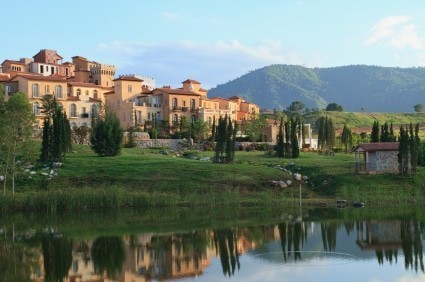

There’s no escaping Prague’s reputation among the British as a cheap stag weekend but look beyond that status and you will find a modern city that continues to be at the heart of what Central Europe has to offer. With history, culture and nightlife a major attraction, it’s become a haven for expats. Along with students and tourists, they’ve formed a Western hub within Prague which has made it increasingly attractive for expats looking for a new life and change in culture, with a support network around them who can offer plenty of help.
Why Prague?
Known as the “Golden City”, Prague is a relatively small capital city (just 500km2) with around 1.3 million inhabitants. It’s been a popular destination for expats ever since the Czech Republic split from Czechoslovakia in 1993, an event which sparked a flurry of activity in investments and the financial sector, and which set Prague on it’s way to being the sixth most visited city in Europe (it only trails London, Paris, Rome, Madrid and Berlin).
One of the reasons for its original infamy as a British stag destination was the cheap cost of food and drink (specifically alcohol), a fact which reached fever pitch during the 90’s once many low fare airlines started offering cheap flights to the city. Since then living standards and prices have increased, approaching those of other Western countries, though everyday shopping items such as groceries and alcohol remain comparatively cheap. According to the Union Bank of Switzerland in 2010, the average cost of living in Prague was 57.5% of the cost of living in New York.
Prague’s History, Architecture and Culture
One of the great things about living in Prague is its connection to history and rich culture. It is fair to say that the city has traditionally been one of the cultural centres of Europe, and continues to be so to this day. Significant institutions include the National Theatre (Národní Divadlo), the Estates Theatre (Stavovské or Tylovo), and the Rudolfinum (home to the Czech Philharmonic Orchestra). This is in addition to countless world-class museums, hundreds of art galleries, exhibitions spaces, cinemas and concert venues.
The architecture in Prague is hard to ignore with a number of buildings by renowned architects, such as Villa Müller (Adolf Loos), Dancing House (Frank Gehry) and Golden Angel (Jean Nouvel).
Where To Live In Prague?
As mentioned previously Prague is a relatively small city. It also has a reliable and extensive public transport network. This means that almost anywhere you choose to live will have good access to the city centre. The Vltava river curves itself around the centre of the city, with the historical centre and famous Prague Castle on opposite sides but connected by the Charles Bridge. [It’s these historical landmarks which have given Prague UNESCO World Heritage status]. Prague’s newer districts are even closer to the city centre and conveniently referred to by numbers given to them by an old administrative law. This makes getting to know the districts when you first move a lot easier. The most popular residential areas for expats moving to Prague include Prague 2 and Prague 6.
Where to Work in Prague?
A lot of the expats who move to Prague work in one of the many multinationals present in the city, with others working in finance, IT or business for Czech firms. There are also a number of expats who will move to the city as foreign embassy staff. These are the expats who have moved to the city as the result of a job opportunity. Other “intrepid” expats will look for a job after arriving. Unsurprisingly a lot of these people end up working as language teachers, a profession that is always in demand in Prague.
Christmas In Prague
With Christmas time approaching it would be remiss not to mention the festive season in Prague, being as it occupies a status alongside Vienna, Geneva and Cologne as one of Europe’s finest Christmas destinations. During the holiday season, Prague’s Old Town converts itself into an otherworldly melange of light, colours, flavours and theatre. The Central Square transforms itself into a stage where marionettes, wooden toys and children dressed in traditional Christmas costumes perform for the always captivated audience. This is a Christmas experience that’s more about the experience than shopping, where a couple of hours can easily drift away with a shot of Becherovka (traditional spicy liquor) in one hand and a Trdelník (cinnamon sugar pastry) in the other before you’ve even realised you were supposed to be shopping.
Moving To Prague
All of this should give you an idea of what to expect from Prague, a city firmly on the up, with rich history and culture, lots of opportunities for work, and a quality of life that won’t break the bank. As long as you can put up with the British stag parties (!) you will find one of Europe’s most interesting and appealing cities is also a great place to live. Click here for moving tips.
Britannia Movers Easter Colouring Competition Here at Britannia, we're experts in transporting fragile items and…
Moving to a new country is an exciting adventure, but it can also come with…
Stamp Duty Land Tax is a tax that is paid by those who purchase property…
Relocating a business is an exciting opportunity to refresh your workspace and set your company…
Deciding to move abroad is an exciting but often overwhelming decision. Whether you're seeking new…
Whether you’re decluttering your home, moving into a new place or just need some extra…